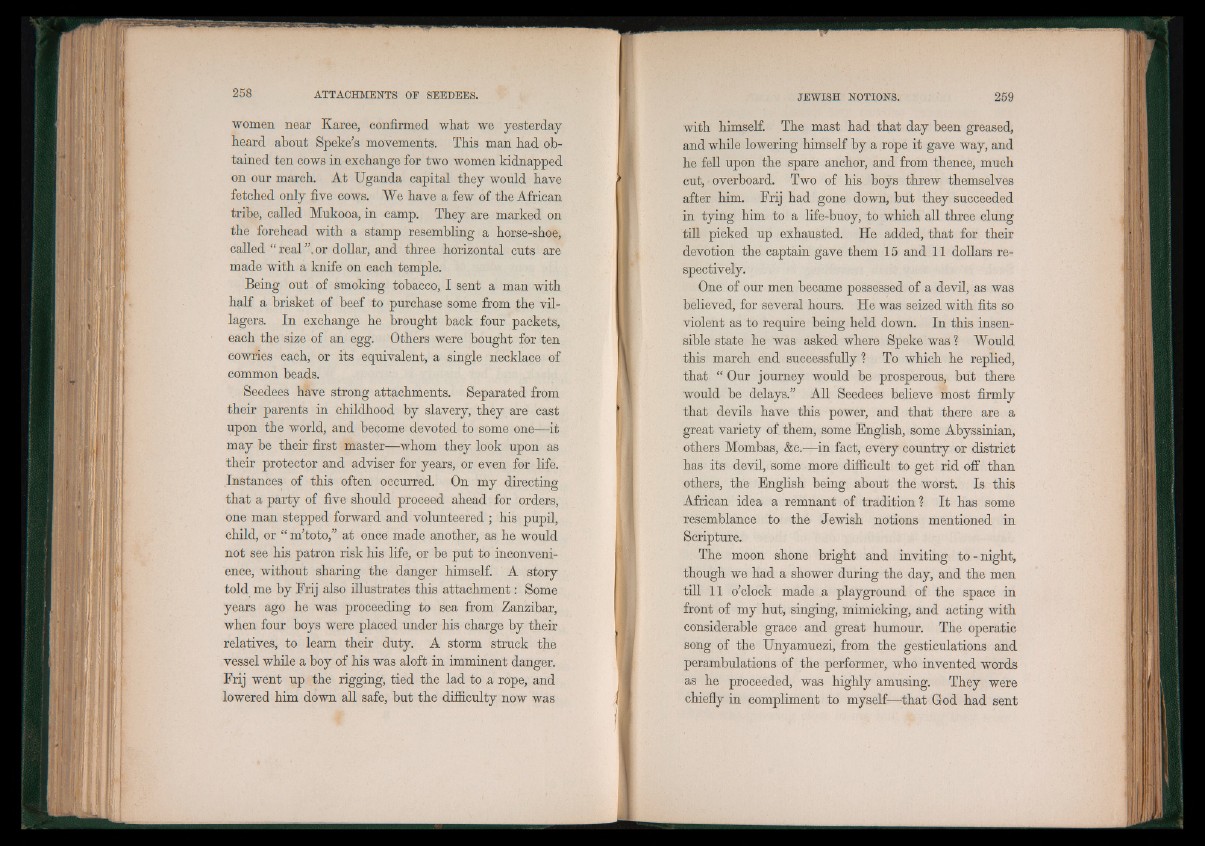
women near Karee, confirmed what we yesterday
heard about Speke's movements. This man had obtained
ten cows in exchange for two women kidnapped
on our march. At Uganda capital they would have
fetched only five cows. We have a few of the African
tribe, called Mukooa, in camp. They are marked on
the forehead with a stamp resembling a horse-shoe,
called “ real”.or dollar, and three horizontal cuts are
made with a knife on each temple.
Being out of smoking tobacco, I sent a man with
half a brisket of beef to purchase some from the villagers.
In exchange he brought back four packets,
each the size of an egg. Others were bought for ten
cowries each, or its equivalent, a single necklace of
common beads.
Seedees have strong attachments. Separated from
their parents in childhood by slavery, they are cast
upon the world, and become devoted to some one—it
may be their first master—whom they look upon as
their protector and adviser for years, or even for life.
Instances of this often occurred. On my directing
that a party of five should proceed ahead for orders,
one man stepped forward and volunteered ; his pupil,
child, or “ m’toto,” at once made another, as he would
not see his patron risk his life, or be put to inconvenience,
without sharing the danger himself. A story
told me by Frij also illustrates this attachment: Some
years ago he was proceeding to sea from Zanzibar,
when four boys were placed under his charge by their
relatives, to learn their duty. A storm struck the
vessel while a boy of his was aloft in imminent danger.
Frij went up the rigging, tied the lad to a rope, and
lowered him down all safe, but the difficulty now was
with himself. The mast had that day been greased,
and while lowering himself by a rope it gave way, and
he fell upon the spare anchor, and from thence, much
cut, overboard. Two of his boys threw themselves
after him. Frij had gone down, but they succeeded
in tying him to a life-buoy, to which all three clung
till picked up exhausted. He added, that for their
devotion the captain gave them 15 and 11 dollars respectively.
One of our men became possessed of a devil, as was
believed, for several hours. He was seized with fits so
violent as to require being held down. In this insensible
state he was asked where Speke was ? Would
this march end successfully ? To which he replied,
that “ Our journey would be prosperous, but there
would be delays.” All Seedees believe most firm ly
that devils have this power, and that there are a
great variety of them, some English, some Abyssinian,
others Mombas, &c.—in fact, every country or district
has its devil, some more difficult to get rid off than
others, the English being about the worst. Is this
African idea a remnant of tradition? It has some
resemblance to the Jewish notions mentioned in
Scripture.
The moon shone bright and inviting to-night,
though we had a shower during the day, and the men
till 11 o’clock made a playground of the space in
front of my hut, singing, mimicking, and acting with
considerable grace and great humour. The operatic
song of the Unyamuezi, from the gesticulations and
perambulations of the performer, who invented words
as he proceeded, was highly amusing. They were
chiefly in compliment to myself—that God had sent